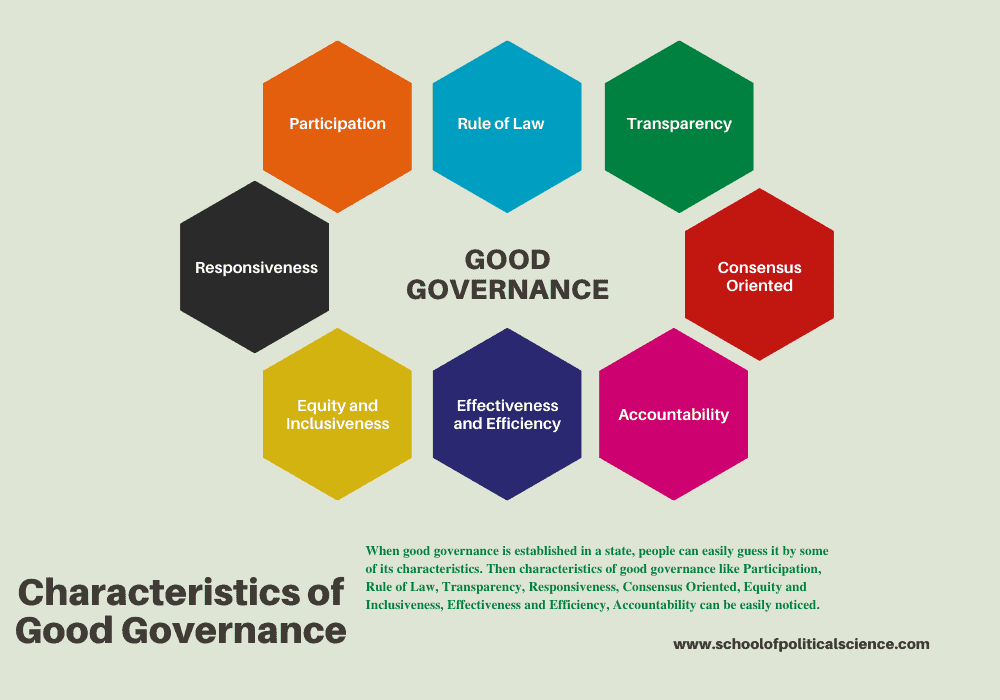Good governance means guiding people in the right direction and uniting them to achieve political goals. It ensures that a country’s resources are used properly for its citizens which leads to sustainable development.
It promotes fairness, transparency, and accountability in decision-making. Good governance also encourages public participation and protects the rights of all individuals. By reducing corruption and ensuring justice, it helps build a stable and prosperous society. In this article you will get the knowledge of what good governance is, characteristics of good governance and its importance.
Must Read- Governance: Meaning, Definitions, 4 Dimensions, And Types
Definitions of Good Governance
According to the world bank (1992), “Good governance is central to creating and sustaining an environment which fosters strong and equitable development and it is an essential complement to sound economic policies”.
According to UNDP, “Good Governance is, among other things, participatory, transparent, and accountable. It is also effective and equitable. And it promotes the rule of law. Good governance ensures that political, social, and economic priorities are based on broad consensus in society and that the voices of the poorest and the most vulnerable are heard in decision making over the allocation of development resources”
The International Monetary Fund (IMF) has defined the concept “as a broad concept covering all aspects of how a country is governed, including its economic policies, regulatory framework, and adherence to the rule of law”.
The IMF very much emphasized promoting the concept of mainly two areas:
- The management of public resources through reforms covering public sector institutions and
- The development and maintenance of a transparent and stable economic and regulatory environment conducive to private sector activities.
Mohit Bhattacharya (2013) has discussed the recent developments of good governance in three ways:
- It is an attempt to widen the scope of public administration by going beyond the formal government.
- It is an externally dictated term invented to prescribe aid conditionality.
- It is a more genuinely democratic intensifying concept- to make public administration more open, transparent, and accountable.
He has also opined that good governance needs to be discussed beyond the World Bank and other funding agencies have been representing this. “A more creative approach would be to treat the issues as new opportunities to have a fresh look at state-civil society relationships in today’s complex world of governance”.
Must Read- 5 Phases of The Evolution of Public Administration
8 Major Characteristics of Good Governance

Governance needs certain standards to be considered good. Based on the definitions, good governance has key characteristics that help manage the economy effectively and strengthen the relationship between the state and society. According to World Bank documents and various studies, there are 8 characteristics of good governance. These are mentioned below-
- Participation
- Rule of Law
- Transparency
- Responsiveness
- Consensus Oriented
- Equity and Inclusiveness
- Effectiveness and Efficiency
- Accountability
1. Participation
The participation of citizens in the process of governance is the key characteristic of good governance. Participation is an important step for mobilizing people to participate in the decision-making process. It can be direct or indirect but Participation needs to be informed and organized. The aims and objectives of the political rights would be fulfilled by the greater participation of the people in the society. The legal framework represents the rule of law which ensures impartiality in terms of participation in the decision-making process of governance.
2. Rule of Law
Another important characteristic of good governance is the rule of law. It needs a fair legal framework to establish the rule of law in society. Rule of law ensures impartiality which helps to protect human rights, particularly who is most marginal in society. The Independent judiciary system, its impartial nature, and the incorruptible police force are the key element to ensure the rule of law.
3. Transparency
Governance needs transparency for the fair delivery of services to the citizens. It ensures a balance between policymaking and its enforcement following proper rules and regulations. It enables the citizen to access governmental information regarding various policies and their implementation freely. Proper media should be established for an easy understanding of this information.
4. Responsiveness
Responsiveness has a basic necessity of the administration which can motivate the interrelationships between administration and people. It requires sufficient services to the people within a specific time.
5. Consensus Oriented
Governance depends on the consensus of people in society to make it good. It could fulfill the interest of the people as well as the community. It helped to achieve the long-term perspective of human development. And it originated from the social culture and institutional behaviors of the particular society.
6. Equity and Inclusiveness
An equitable just society must be established for ensuring good governance. Society’s well-being depends on how its members feel about it. It requires all its members to feel that they have a stake in it and they are not excluded from the mainstream in the governance.
7. Effectiveness and Efficiency:
Effectiveness and efficiency ensure the outcomes of the institutions to meet the needs of society. Proper utilization of society’s resources for the establishment of sustainable development is the key to good governance. It also ensures the sustainable use of natural resources for the protection of the environment.
8. Accountability
Accountability is one of the most important characteristics of good governance. Good governance depends on how accountable Governmental, as well as private sectors and civil society organizations, are to their people and their institutional stakeholders. Without transparency and the rule of law, accountability cannot be established.
Must Read– New Public Management: Meaning, Principles, And Features
Importance of Good Governance
The importance of good governance in a state is immense. Sustainable development is not possible without good governance.
Economic Development
Without good governance in a state, the economic development of that state is not stable. All elements of economic development, such as production, distribution, investment, and even consumption, face various obstacles. If good governance is established, such obstacles will be removed and the fair distribution of state resources will be possible.
Social Development
Good governance is essential for social development. The role of it does not end only with economic development. The result of development ensures that every class of people in society enjoys the basis of fairness. People of different religions, castes, and classes live in a society. Now, if there is no fair distribution of wealth among all these people, social discontent will increase.
Again, the proper distribution of wealth is not enough. We have to make arrangements so that minority people can walk without fear. In the same way, various reform laws have to be enacted to reduce the gap between men and women in society.
Political Development
Its relationship with political development is quite important. If the political leaders of a country are not active in establishing good governance, then its establishment in that country is not possible. Its success depends largely on the sincerity of the political leadership and adherence to the rules and regulations of the political establishment.
The constructive cooperation between the political institutions and the political parties and the formulation of programs for the welfare of the people play an important role in establishing good competition and good governance among themselves. For example, in a democracy, mutual cooperation between the government and the opposition helps to establish it in the country.
Must Read- E-Governance: Meaning, Objectives, Features, and 4 Types
Conclusion
In conclusion, good governance is the proper management of the state, society, and resources. It seeks to protect the interests of people from all classes. It emphasizes public sector management, the legal framework for development, accountability, transparency, and the free flow of information.
When good governance is established in a state, people can easily guess it by some of its characteristics. Then characteristics of good governance like Participation, Rule of Law, Transparency, Responsiveness, Consensus Oriented, Equity and Inclusiveness, Effectiveness and Efficiency, and Accountability can be easily noticed.
There is good governance for political, economic, and social development. Good governance and development complement each other. It protects the social, economic, and political rights of citizens irrespective of race, religion, caste, or gender. As a result, a country’s development index tends to go up.
Must-Read: Development Administration: Meaning, Features, And Challenges
References
- Bhattacharya, M. (2013). New Horizons of Public Administration. New Delhi: Jawahar Publishers.
- Mangla, S. (2015). Citizenship and Governance. New Delhi: Kaveri Books.
- Narzary, M. (2015). Concept of Good Governance. In S. Mangla (Ed), Citizenship and Governance (pp. 17-45). New Delhi: Kaveri Books.
- Singh and Sachdeva. (2012). Public Administration: Theory and Practice, Noida: Pearson Publication.


Comments are closed.